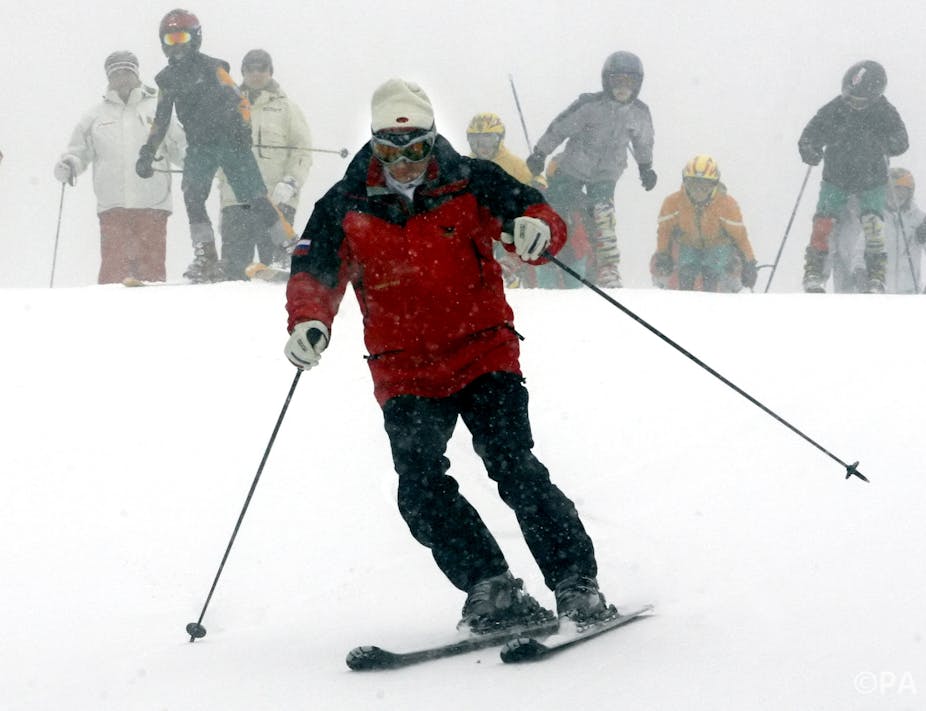President Vladimir Putin has a shiny new toy, the Winter Olympics, and he wants to hold a party to show it off. His “friends” are jealous and either want to dash the present from his hands or refuse to come to the party. In true Cold War fashion, from the moment the party was announced, western media and politicians have tried to spoil Russia’s fun.
Initially, and not surprisingly since Sochi is the main resort of the Russian Black Sea Riviera, it was suggested there would not be any snow. However, Sochi had copious snow so, having failed with Spoiler Plan A, it was time to look for a backup.
Hypocrisy rules
In contemporary Russia one does not normally have to wait long for something objectionable to emerge. In Pussy Riot, and the law banning encouragement of gay lifestyles to underage children, a foundation was established for Spoiler Plan B.
Of course, one might ask, when can one uncomplainingly take part in a grand occasion like the Olympics in a state which orders that “materials adopted by a local school board … shall … comply with state law and state board rules … prohibiting instruction … in the advocacy of homosexuality”? The answer is: “When that state is Utah and it is part of the USA.”
The extract comes from Utah state law. One of the most corrupt Olympic Games of recent times were held in Salt Lake City in 2002. Utah is one of eight American states with currently active laws or directives banning so-called gay propaganda in schools. In addition, one can only speculate what might have happened to Pussy Riot had they located an ill-advised provocation in one of the more hot-headed Christian fundamentalist strongholds in the US Bible belt.
In any case, at around the same time, a man who defaced a painting of the Queen in Westminster Abbey received a six-month jail sentence.
This does not excuse what has happened in Russia. The point is, the hypocrisy with which the mainstream media and political classes, especially in Britain and the USA, approach the country. The breathtaking way they attack Russia for attitudes and actions present in their own societies seems to be unrelenting.
If one gives it even a slight historical perspective the hypocrisy becomes even deeper. It is only 30 years or so that the process of gay emancipation really took off in the UK. At that time, thuggish violence against gay people, “comic” and other innuendo and informal discrimination were the norm. And none of these has disappeared from our own societies.
Devastating century
Russia itself has had a devastating century. The mother of a great friend of mine in Moscow who I have known since the 1970s, reached her 100th birthday in December. When she was born, Nicholas II was the seemingly impregnable Tsar of All the Russias. The devastation (not all of it self-inflicted) of world war, revolution and civil war reset Russia’s industrial development meter back to zero by 1921.
After only 20 ferocious years (collectivisation, industrialisation, famine, purges) it faced the greatest military onslaught in history and, after being at risk of defeat for two years, began a massive counter-attack that ripped Hitler’s armies to shreds. Had D-Day not eventually happened nothing could have prevented the Russian army from reaching Calais.
The cost – 27m dead, 25m homeless – set the development button back to zero again in 1945, yet within five years they had nuclear weapons and in 15 were leading the space race. As if that was not enough, the collapse of the Soviet Union and the appalling rule of Yeltsin, while less devastating than Russia’s other tragedies which my friend’s mother has lived through, set Russia back materially and culturally by a decade or two.
Suffering and debilitation on this scale, almost always eagerly egged on by some or other part of the outside world as well as the obvious self-inflicted wounds of the Stalinist 1930s have created a massively complex and deeply damaged, at times almost psychotic, society and culture in Russia.

Putin has been loved by many Russians for stabilising the country in the wake of Yeltsin and for beginning the process of re-establishing the country as a great power. Both of these are works in progress and Putin is showing worrying signs of slipping in both areas with a resultant dip in his poll ratings. However, one of the things that makes Putin popular is his obvious lack of concern for foreign critics. From Tarzan photos to keeping foreign dignitaries waiting the message is: “We can look after ourselves and we do not need you!” Russians love it.
The boycott of the opening ceremony by western leaders will play into his hands. The point, however, is for Russia and the West to move on from the politics of three-year olds into a more mature and fruitful engagement on both sides.

